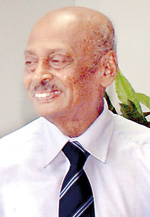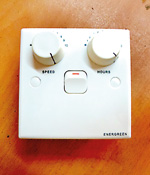An energy-saving lifestyle change
Remember all those times you forgot to switch off your room’s ceiling fan and earned a big earful from your parents or spouse? Those days may well be a thing of the past soon enough, thanks to Professor K.K.Y. Perera who has invented an automatic electronic speed and time controller (known as a Smart Fan Controller) for ceiling fans.

Pix by Athula Devapriya

Professor K.K.Y. Perera and his ‘Smart Fan Controller’ (left).
Prof. Perera’s invention is brand new; “there’s nothing like this in the world,” he tells us. Uptil now, electrical engineers were stumped when it came to the logistical difficulty of incorporating an electronic timer in the average ceiling fan regulator. This inventor navigates around the challenge by using a solid state integrated circuit which includes a timer and a system to efficiently control speed in a ceiling fan. It’s so useful that he gives it the best guarantee by using it in his own home. “I save a significant deal of energy,” he enthuses.
Hearing the inventor and engineer’s credentials it’s not difficult to imagine the inspiration behind this invention. K.K.Y. Perera grew up in a small village near Yakkala, where he walked barefoot to school and aspired for the best marks among his friends. This paid off in the form of a scholarship to Ananda College in Colombo, where he completed his SSC and HSC level examinations.
In university (University of Ceylon) he studied for a BSc in Engineering, moving on to study nuclear engineering for his MSc from the University of Birmingham and switching back to electrical engineering for a PhD from the University of British Columbia. He is a Fellow of the Institution of Electrical Engineers (London), a Fellow of the Institution of Engineers (Sri Lanka) and a Fellow of the National Academy of Sciences (Sri Lanka). Perera was also the recipient of a Vidya Jothi, a Sri Lankan national honour awarded for outstanding scientific and technological achievements.
Prof. Perera was the first founding Dean of the Faculty of Engineering at the University of Moratuwa, later serving as President and Vice Chancellor. He also served as Chairman of the Ceylon Electricity Board and as the Secretary of the Ministry of Power and Energy. It was during this time, he says, that the need for the conservation of energy was made glaringly apparent. “I noticed that when it came to electrical fans in particular, people were wasting a lot of energy,” he says. “But there was no such device that could let you time a fan, for example like you would with a microwave.”
Thus in 2007, Perera and his research team embarked on a project to develop a smart fan controller. The research and development process was funded by the National Science Foundation at the start, with assistance from several other organisations. The challenge to be overcome was the non-availability of the neutral wire at the fan regulator (instead it goes directly to the fan terminal at the ceiling)-only the phase wire is present here making it impossible to incorporate an electronic timer in the fan regulator due to the absence of a power source at the regulator.

The team overcame this challenge by using a novel micro-electronic low power design and a solid state integrated circuit. Now, users can regulate the time their ceiling fan stays switched on for (“I usually put the timer on for two hours and go to sleep,” shares Prof. Perera. “I save about six to seven hours of electricity because it gets colder in the night and I don’t need the fan then”) and monitor the speed as well. “I save about 50% of the energy that the ceiling fans at my home require,” Prof. Perera says. “This will depend on individual preferences. It’s very useful for offices and schools as well.”
The controller is energy efficient, environment friendly and does not require batteries to function. Its setup is simple, with a single switch to switch on or off the fan and two insulated control knobs for the timer and speed. The timer itself can be set for up to 10 hours at continuously variable speed settings. It is available commercially (at a retail price of Rs. 1500) at selected places including at the Institution of Engineers. Anyone can set up the device, Prof. Perera notes. “That was one of the main goals when we designed the circuit-a user can easily understand the manual, it doesn’t require any change in the normal electrical wiring and setting up is the same as for a conventional switch.”
For his invention Prof. Perera was awarded a Presidential award for innovation in the field of engineering in 2014. As a shortlisted inventor for the Ray, he stands a chance to receive a grant of Rs. one million; his invention is commercially viable, thus he has not had the same troubles as his contemporaries, but says that nevertheless the process has been complicated and occasionally disheartening. The controller is patented but they’ve had their hiccups-“we tried to protect the circuit’s design but certain people actually used chemicals to get inside and figure out the wiring,” he smiles ruefully.
The team has marched on, however, and continues to produce the controllers with precision and great care. Each unit is carefully tested before it goes out into the market. It’s a slow process but one that Prof. Perera insists on. Like every genuine inventor, the joy for him is not in the profits- but in seeing a lifestyle change thanks to his idea.


